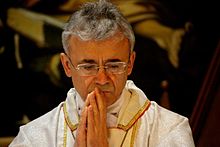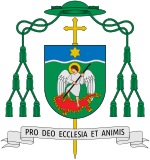Joseph Werth SJ | |
|---|---|
| Bishop of Transfiguration at Novosibirsk | |
 | |
| Church | Catholic Church |
| See | Latin Diocese of Transfiguration at Novosibirsk |
| In office | February 11, 2002[1]–present |
| Predecessor | HE Msgr Jerzy Mazur SVD |
| Successor | incumbent |
| Orders | |
| Ordination | May 27, 1984 |
| Consecration | June 16, 1991 by Francesco Colasuonno, Tadevush Kandrusievich, and Juozas Tunaitis |
| Personal details | |
| Born | October 4, 1952 |
| Coat of arms |  |
Joseph Werth SJ (Russian: Иосиф Иоганнович Верт; born October 4, 1952, in Karaganda, Kazakhstan) is Bishop of Transfiguration in Novosibirsk (Russia).
Named as the Latin Church Apostolic Administrator of Siberia—a see that encompassed 4.2 million square miles (10.3 per cent of all the land on earth) and extends through nine of the world's twenty four time zones—by Pope John Paul II on April 13, 1991, Werth initially had only two Ukrainian-born priests to help him minister to an estimated 500,000 Catholics. He has since assembled over 100 priests, nuns and lay missionaries from 18 different countries, mostly from Poland, Germany, and Slovakia, but also Nicaragua, Lebanon, India, Argentina, South Korea, and other countries. At least fourteen are from the United States.
The Apostolic Administration of Siberia was divided in 1999 into the Apostolic Administrations of Eastern and of Western Siberia, and the Apostolic Administration of Western Siberia was elevated in 2002 to the rank of a diocese, the Diocese of Transfiguration in Novosibirsk. The center of his diocese is at Novosibirsk, the capital of Siberia, where the cathedral stands. He has sent church workers to the largest cities of Siberia, as well as many towns with sizeable Catholic populations.
Joseph Werth began studies for the priesthood clandestinely in Lithuania under the direction of a leader of the underground Jesuits, who also secretly accepted him into the Lithuanian Province of the Society of Jesus. Later he completed his studies at the seminary in Kaunas. In 1984 Father Werth became the first Roman Catholic priest ordained since the 1930s in the Asian part of the former Soviet Union.
He pursued pastoral work at Aktyubinsk, Kazakhstan from 1984 till 1988. He was reportedly so successful in his ministry at Aktyubinsk that the local communist officials expelled him from the city in 1988. [citation needed]
In 1988 he moved to Marx in Russia's Saratov oblast, where two of his own sisters (both Sisters of the Blessed Sacrament) had organized about thirty Catholic congregations among the thousands of ethnic Germans who, following the death of Stalin, had returned to the area of the former Volga German Republic. He served there until 1991.
In December 2004, the Congregation for the Eastern Churches appointed him as Ordinary for Catholics of the Byzantine rite in the Russian Federation—that is, for Catholics who use the same liturgical rite as the Russian Orthodox Church, as well as for immigrants from Ukraine, practicing the rite of the Ukrainian Greek Catholic Church.
Bishop Werth is fluent in Russian, German, and Lithuanian.